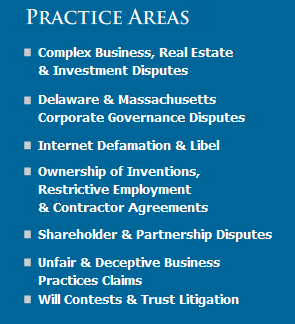Boston, MA Business Fraud Attorney
Sometimes the sanctity of contract conflicts with a larger public policy “that parties to contracts, whether experienced in business or not, should deal with each other honestly, and a that a party should not be permitted to engage in fraud to induce a contract.” McEvoy Travel Bureau, Inc. v. Norton, Co., 408 Mass. 704, 712-13 (1990).
Suppose two experienced business people, each represented by attorneys, conducted a multi-staged negotiation for the sale of one of the seller’s product lines. During the negotiations the seller had said “if you buy this product line from me, my company will promote the product, offer it to our customers and educate customers how to use it.” The contract subsequently entered into however provided that the seller was not obligated to use its best efforts to sell the product line. When the seller did not promote the product, the buyer sued alleging he had been defrauded because he had relied on the seller’s false representation of intent and was injured. Because both parties “were experienced in business and the contract was fully negotiated and voluntarily signed, …[the buyer who was injured] may not raise as fraudulent any prior oral assertion inconsistent with a contract provision that specifically addressed the particular point at issue.” Turner v. Johnson & Johnson, 809 F. 2d 90,97 (1st Cir. 1986).
The Court’s reasoning was that “representations made during the give-and-take of negotiations” inconsistent with the final form of a fully negotiated agreement between sophisticated parties cannot be the basis for a fraud claim because otherwise “the language of the contract simply would not matter anymore.” Id. at 96. To recover for fraud the plaintiff must “reasonably rely” on the misrepresentation. So ask yourself how can a sophisticated business party who thoroughly negotiated the terms claim to have reasonably relied on a representation that was clearly contradicted by the written contract.
But consider the McEvoy case. McEvoy was a small travel agency who for more than thirty years with no written contract had provided services for the Norton Company, an international conglomerate also located in Worcester. Norton proposed to make McEvoy its exclusive travel agent for all its Worcester area business. For his part McEvoy, signed a five-year lease in the same building as one of Norton’s offices, hired additional personnel and purchased new computer and other systems to handle the increased business. Norton then insisted on a contract and presented McEvoy a renewable one year contract terminable at any time by Norton on sixty days notice. When McEvoy expressed concern, Norton reassured him that they would continue to have a long term relationship and that “the termination clause … was a mere technicality that Norton’s law department had required.” McEvoy Travel Bureau, Inc. v. Norton, Co., 408 Mass. at 708. Based on these oral statements, McEvoy signed the contract. But unbeknownst to McEvoy, Norton was treating the arrangement as “a trial arrangement.” In each of the next two years, one year contracts with the same 60 day termination provision were signed; and, in each instance there was no discussion about the termination clause. In the third year Norton exercised the termination clause and hired another travel agency. McEvoy sued for fraud.
Because Norton had falsely misrepresented its intention not to exercise the termination clause and McEvoy had reasonably relied on the false statement of intent when he signed the third successive one year contract and suffered damages, he could recover.
How can this be? The misrepresentation about not terminating the relationship was contradicted by the plain language of the contract.
Before McEvoy had begun to perform there was no discussion about termination; and, the “misrepresentations were not part of the negotiations but were made immediately prior to signing the initial contract.” McEvoy, 408 Mass. at 711. The exact timing of the false statement is not determinative; what is required is proof that the fraud was operative at the time the contract was signed. Id. at 712.
.

